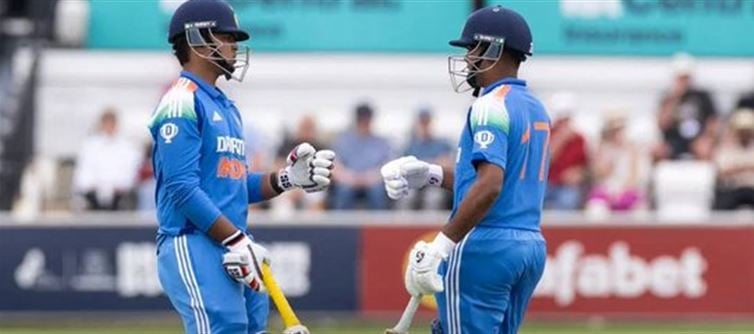
When Promise Becomes Burden: The High-Stakes Gamble Behind India’s Teenage IPL Stars — The Ayush Mhatre Case Study
At 17, most teenagers are still figuring out college options, navigating adolescence, and juggling the pressures of exams and friendships. But for Ayush Mhatre, life fast-forwarded into adulthood the moment he stepped into the yellow jersey of the chennai Super Kings. Overnight, he wasn’t just a promising young cricketer; he became a symbol — of hope, of risk, and of cricket’s increasingly unforgiving talent machine.
Ayush’s rise is the kind that indian cricket loves to celebrate. A boy from Virar with a bat, boarding mumbai locals at dawn, piling up domestic runs, and suddenly thrust under the floodlights of the IPL… it’s cinematic. It’s inspirational. It fits every narrative of grit, sacrifice, and destiny.
But beneath the applause, there lies a far more uncomfortable truth: India’s obsession with early talent may be creating stars faster than it is protecting them.
And Ayush Mhatre’s story is the perfect case study of that dangerous trend.
The Fairy-Tale Selection… or a Calculated Risk?
When CSK announced Ayush Mhatre as the replacement for injured captain Ruturaj Gaikwad, headlines called it “a bold move.” But bold for whom?
For the franchise, it was smart marketing plus a low-cost long-term bet. For the fans, it was a storyline to latch on to. But for the teenager in question — barely old enough to vote — it was the beginning of a pressure cooker.
The IPL isn’t just a cricket league. It is a billion-dollar entertainment beast where failure is dissected, amplified, and permanently archived. A single innings can redefine public opinion, and a two-match lean patch can turn praise into mockery.
To place a teenager at the centre of that spectacle is a high-stakes gamble — and not necessarily a fair one.
The Double-Edged Sword of Instant Fame
Ayush’s early performances — including that blistering 90-plus knock and the viral net-session video with Jadeja stunned — made him an instant fan favourite. Suddenly, he wasn’t a newcomer. He was the next big thing.
That label brings cheers, clicks, endorsements… and a heavy psychological price.
The indian cricket ecosystem is notorious for building players up too fast, too early. prithvi Shaw, Sarfaraz Khan, even the once-hailed teen sensation Unmukt Chand — all reminders that the jump from prodigy to professional is rarely smooth.
Unlike senior cricketers who have years of grind behind them, teenage players get fame before they get a career.
Ayush is now part of that fragile pipeline — where expectations rise faster than skills can mature.
Commercialisation Before Consolidation
Before Ayush could even finish celebrating his early IPL success, brands lined up.
A fintech company onboarded him as ambassador. His instagram following exploded. His clips populated reels, edits, and memes.
But this commercial rise poses a troubling question:
Are cricketing achievements being overshadowed too quickly by market value?
Teenage cricketers today experience three overlapping pressures before they’re fully formed as players:
Prove yourself as a performer
Build yourself as a brand
Defend yourself as a public figure
This shift — from batsman to “content generator” — is a modern burden previous generations never had to carry.
The Invisible Mental Cost
Every six, every mis-hit, every dropped catch becomes evidence in a courtroom called social media. For a 17-year-old, public scrutiny can push self-doubt into crippling anxiety.
Sports psychologists warn that early exposure to mass attention can disrupt emotional development. The brain is still forming; identity is still fragile.
Now add:
Performance pressure
Franchise expectations
Public comparisons
Fan toxicity
Media judgement
Constant online tracking
This cocktail can overwhelm even seasoned players. For a teenager, it can become unsustainable.
Ayush’s calm demeanour on screen may suggest maturity beyond his age, but no teenager is built to carry a state’s hopes, a franchise’s future, and a nation’s commentary.
Is india Fast-Tracking Youth… or Setting Them Up to Fail?
The pipeline of young stars in india is only getting more aggressive. Scouts want 16-year-olds. Franchises want “the next Gill”. Fans want fireworks instantly.
But in this race to discover the next phenomenon, the system rarely considers the long-term consequences.
There are three major risks:
1. Burnout before Peak
Players debut young but peak early or fade early.
Immense pressure + rapid exposure = shrinking career span.
2. Skill Development Gets Compromised
When success arrives fast, technical flaws remain unaddressed.
For a young cricketer, early applause interrupts the growth curve.
3. Identity Crisis
When a player’s identity becomes tied to public validation, failure becomes personal catastrophe.
Ayush Mhatre is on the cusp of greatness. But he is also positioned at the edge of this dangerous model.
A Path Forward: Protecting the Player, Not Just the Product
If indian cricket wants its teenage stars to shine longer, not burn brighter, it needs structural safeguards:
Mandatory sports psychologists at franchise level
Rotational exposure instead of overuse
Strict media/protocol training for teen players
Mentorship systems pairing youngsters with seniors
Protection from social-media toxicity
Patience in allowing failures during growth years
These aren’t luxuries — they are necessities for safeguarding India's future talent.
Conclusion: Celebrate the Boy, but Save the Man
Ayush Mhatre is an extraordinary talent — fearless, gifted, instinctive.
But he is also a child growing up in an industry where innocence is the first casualty.
His rise should spark celebration… and caution.
Because in india, cricketing promise is often met with crushing expectation.
And if we don’t build a softer landing for our youngest stars, their promise may turn into burden long before their potential turns into legacy.
Ayush isn’t just the story of a prodigy.
He is a warning — that the future of indian cricket depends not on how fast we produce stars, but on how responsibly we protect them.




 click and follow Indiaherald WhatsApp channel
click and follow Indiaherald WhatsApp channel